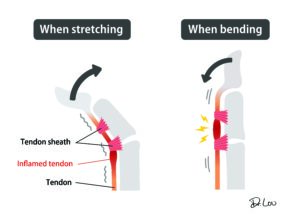Guitar player magazine reported that the great Steve Vai is recovering from surgery following a “trigger finger” diagnosis, which was the result of the sustained holding of a chord. What is trigger finger, how does it affect musicians, and what can you do to prevent and resolve it?
What Is Trigger Finger?
Simply put, trigger finger is when a finger gets stuck in the bent position. Much like a tendonitis, the soft tissue becomes inflamed and extremely contracted. Sometimes the finger releases and snaps, like a trigger. The medical term for this condition is “stenosing tenosynovitis,” which basically means that there is a shrinking of the sheath of tissue around a tendon of the finger that causes it to become restricted and contracted with inflammation.
Slow fingers? Poor Muscle Memory? Musician Finger Speed Solved.
The cause of trigger finger is often repetitive stress. In musicians, “Playing Related Musculoskeletal Disorders” are called PRMD’s. Prevention of PRMD’s includes proper warming up, stretching, strengthening, post play cool down, taking breaks and evaluating daily activities that could make one more vulnerable to PRMD’s. Things like computer work, cooking, driving, sleep position, history of injuries and activities may all contribute to vulnerability and perpetuation of your injury. A comprehensive assessment one one’s history and current lifestyles essential for identifying how to heal and prevent future problems. It’s not enough to simply evaluate one’s playing schedule, intensity, posture, etc. Other lifestyle factors make musicians more vulnerable to PRMD’s
Surgery and Intervention for trigger finger
Surgical intervention like that which Steve Vai underwent will often help, but requires healing and rehab time. It’s important to consider that procedures to help are injections, needle release, and surgical incisions. Anytime a sharp object pierces or cuts human tissue, there is a risk, high risk of scar tissue in the area treated. For any serious musician, this could be problematic. Will that scar tissue make you more prone to recurrence once playing again with regular frequency? Will it create permanent, immobilizing scarring?
It’s important that you know that with lots of repetitive play, you may not be able to avoid this condition, it’s only your fault for trying to play your best. Less invasive treatments are available but may also be undesirable…like rest from play. Splinting of the finger sometimes helps, stretching may also help.

Trigger finger is big trouble for musicians. (207) 774-6251 telemedicine with Dr. Lou, Chiropractor and musician specialist. Portland, Maine.
Signs You Need Help for trigger finger
If you fingers are stiff, if you notice popping or clicking in your finger, a bump or nodule in the palm or underside of your finger, if it’s locking or stuck in a bent position, you should not wait for it to go away. Seek help and stop playing immediately. The sooner you deal with the problem and address the cause, the easier your road ahead. It will unlikely go away in the “same environment” that created the problem, so you shouldn’t count on “playing through” the injury.
Steve Vai will likely make a full recovery, thank god, but not without concern over what it could mean for his career if he doesn’t get 100% function back. In a finely tuned Ferrari like music machine, like Steve Vai, every microscopic bit of function, precision and reaction time matters. He won’t be happy with any degree of compromise.
Dr. Lou Jacobs is a chiropractor – acupuncturist in Portland, Maine who has been specializing in musician injuries and crew injuries for 20 years. Dr. Lou is available for telemedicine consultations for music-related injuries and health problems. Among those he has permission to mention, Dr. Lou has worked with Mumford & Sons, The Pixies, Steve Vai, Tommy Emmanuel, Ziggy Marley and the Melody Makers, Blackberry Smoke, Gogol Bordello, Trey Anastasio, and Edward Sharpe and the Magnetic Zeros. PHOTOS

Dr. Lou with Steve Vai.
